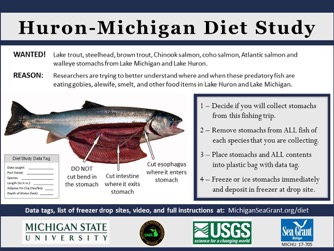MSU prof seeks crowdfunding support for Great Lakes fish diet research
You can be a part of this important study by donating to support student researchers analyzing stomach samples from Lake Michigan and Lake Huron.
 In 2017, anglers around the Great Lakes teamed up with scientists from U.S. Geological Survey, U.S. Fish & Wildlife Service, Michigan Department of Natural Resources (DNR), Wisconsin DNR, Michigan Sea Grant, Little Traverse Bay Bands of Odawa Indians, and Michigan State University to collect and freeze fish stomachs to help with the Great Lakes Predatory Fish Diet Study. A lot of stomachs were collected but additional staffing is needed in order to analyze all of them.
In 2017, anglers around the Great Lakes teamed up with scientists from U.S. Geological Survey, U.S. Fish & Wildlife Service, Michigan Department of Natural Resources (DNR), Wisconsin DNR, Michigan Sea Grant, Little Traverse Bay Bands of Odawa Indians, and Michigan State University to collect and freeze fish stomachs to help with the Great Lakes Predatory Fish Diet Study. A lot of stomachs were collected but additional staffing is needed in order to analyze all of them.
As we all know, the Great Lakes have changed a lot in the last decade or so. Alewife have declined, round goby are increasing, and lake trout and walleye continue to recover. Chinook salmon, the heart of Lake Michigan's fishery, have fluctuated in numbers in the past few years, and have collapsed in Lake Huron. Our fisheries agencies must make informed decisions regarding stocking and levels to support both fisheries and conservation goals. These decisions are based in part on what those predators are eating. What predators eat is an excellent indicator of ecosystem health, and can help tell us how sustainable the fishery is.
With the tremendous help of recreational anglers, MSU together with state, federal, and tribal agencies have collected nearly 2,000 predator stomachs from around Lake Michigan and Huron. We need help to be able to analyze all of them, particularly those from Lake Michigan. MSU has a wealth of potential help in terms of undergraduate students eager to gain valuable research experience. However, funding is needed to pay these students for their work.
Would you help by contributing to this research effort?
With the help of MSU CrowdPower, any donations made at https://givingto.msu.edu/crowdpower/predatory-fish-study will go directly to the predator diet study. Any donation will help, and all donations are tax deductible.
Want to stay up-to-date on the project?
We have several other ways to connect including:
- Like the Facebook page at https://www.facebook.com/Huron-Michigan-Predator-Diet-Study-593235801067783/
- Follow the project on Instagram: https://www.instagram.com/greatlakespredatordiet/
- Or follow it on Twitter: @ichthyprof
- Web page for diet study and other Great Lakes angler citizen science efforts: http://www.miseagrant.umich.edu/explore/fisheries/great-lakes-angler-science-fishing-for-answers/
Michigan Sea Grant helps to foster economic growth and protect Michigan’s coastal, Great Lakes resources through education, research and outreach. A collaborative effort of the University of Michigan and Michigan State University and its MSU Extension, Michigan Sea Grant is part of the NOAA-National Sea Grant network of 33 university-based programs.



 Print
Print Email
Email




